Lecture 5 Word Formation-《英语词汇学》第五章教案
Wordformation英语构词法课件下载
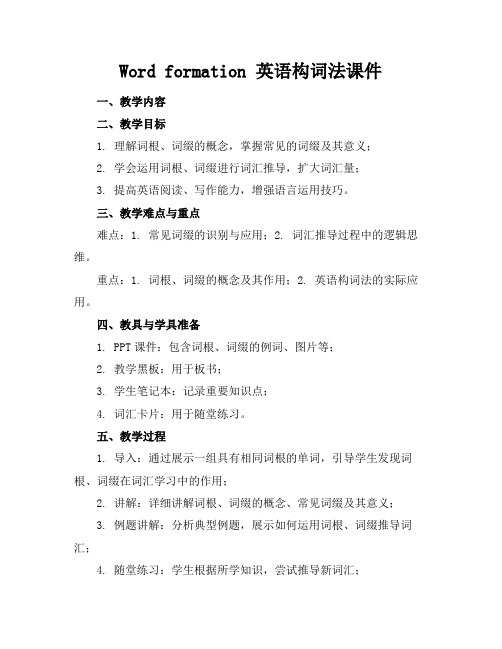
Word formation 英语构词法课件一、教学内容二、教学目标1. 理解词根、词缀的概念,掌握常见的词缀及其意义;2. 学会运用词根、词缀进行词汇推导,扩大词汇量;3. 提高英语阅读、写作能力,增强语言运用技巧。
三、教学难点与重点难点:1. 常见词缀的识别与应用;2. 词汇推导过程中的逻辑思维。
重点:1. 词根、词缀的概念及其作用;2. 英语构词法的实际应用。
四、教具与学具准备1. PPT课件:包含词根、词缀的例词、图片等;2. 教学黑板:用于板书;3. 学生笔记本:记录重要知识点;4. 词汇卡片:用于随堂练习。
五、教学过程1. 导入:通过展示一组具有相同词根的单词,引导学生发现词根、词缀在词汇学习中的作用;2. 讲解:详细讲解词根、词缀的概念、常见词缀及其意义;3. 例题讲解:分析典型例题,展示如何运用词根、词缀推导词汇;4. 随堂练习:学生根据所学知识,尝试推导新词汇;6. 作业布置:布置课后作业,巩固所学知识。
六、板书设计1. 板书Word Formation English wordbuilding methods2. 主要内容:词根、词缀的概念;常见前缀、后缀及其意义;词汇推导方法;实例展示。
七、作业设计1. 作业题目:b. 根据所学词根、词缀,推导出5个新词汇,并给出简要解释。
2. 答案:Happy → Unhappy(前缀“un”表示否定)Do → Undo(前缀“un”表示否定)Bind → Unbind(前缀“un”表示否定)Cover → Uncover(前缀“un”表示否定)八、课后反思及拓展延伸拓展延伸:引导学生关注其他语言中的构词法,如法语、德语等,了解不同语言之间的构词特点,提高跨文化交际能力。
重点和难点解析1. 教学难点与重点的识别;2. 教学过程中的例题讲解;3. 作业设计中的词汇推导;4. 课后反思及拓展延伸的实践应用。
一、教学难点与重点的识别在英语构词法的教学中,识别并明确难点和重点是至关重要的。
词汇学 第五章

4. What is sense语义? sense语义? The sense of an expression is its place in a system of semantic relationships with other expressions in the language. 词语的意义是它在语义关系系统中同其它词 语相对的位置。
自考《英语词汇学》复习资料第五章
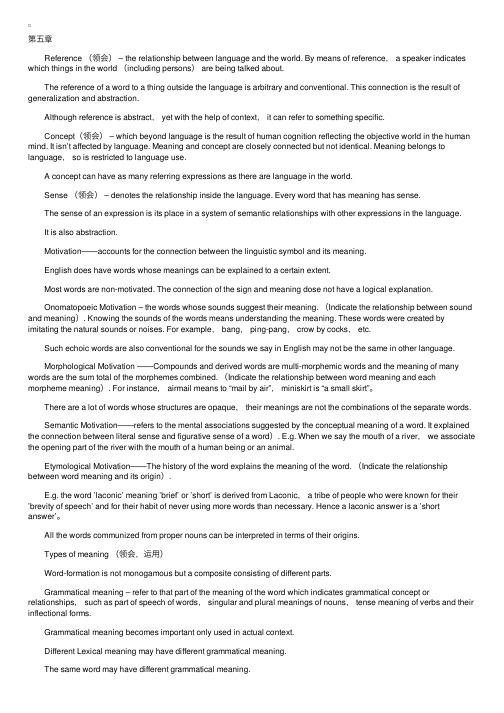
第五章 Reference (领会) – the relationship between language and the world. By means of reference, a speaker indicates which things in the world (including persons) are being talked about. The reference of a word to a thing outside the language is arbitrary and conventional. This connection is the result of generalization and abstraction. Although reference is abstract, yet with the help of context, it can refer to something specific. Concept(领会) – which beyond language is the result of human cognition reflecting the objective world in the human mind. It isn’t affected by language. Meaning and concept are closely connected but not identical. Meaning belongs to language, so is restricted to language use. A concept can have as many referring expressions as there are language in the world. Sense (领会) – denotes the relationship inside the language. Every word that has meaning has sense. The sense of an expression is its place in a system of semantic relationships with other expressions in the language. It is also abstraction. Motivation——accounts for the connection between the linguistic symbol and its meaning. English does have words whose meanings can be explained to a certain extent. Most words are non-motivated. The connection of the sign and meaning dose not have a logical explanation. Onomatopoeic Motivation – the words whose sounds suggest their meaning. (Indicate the relationship between sound and meaning). Knowing the sounds of the words means understanding the meaning. These words were created by imitating the natural sounds or noises. For example, bang, ping-pang, crow by cocks, etc. Such echoic words are also conventional for the sounds we say in English may not be the same in other language. Morphological Motivation ——Compounds and derived words are multi-morphemic words and the meaning of many words are the sum total of the morphemes combined. (Indicate the relationship between word meaning and each morpheme meaning). For instance, airmail means to “mail by air”, miniskirt is “a small skirt”。
英语词汇学第5章课件
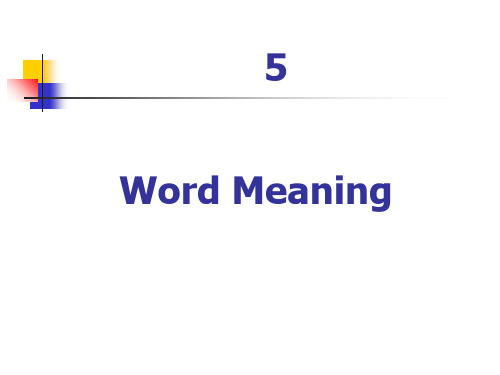
5. 2. 1. Onomatopoeic Motivation
Words whose sounds suggest their meanings = onomatopeic words
Two types of words according to their resemblance of sound:
Characteristics: 1. Different lexical items, which have
different lexical meanings, may have the same grammatical meaning: tables, men, oxen, potatoes
5. 1. 1. Concept
the meaning triangle
concept/idea
tnce
5.1.2 Concept
It is universal to all men alike regardless of culture, race, language and so on, whereas meaning belongs to language, so is restricted to language use.
1. Primary onomatopoeia
bow wow
ha ha
ping-pong miaow
cuckoo
tick-tuck
5. 2. 1. Onomatopoeic Motivation
2. Secondary onomatopoeia cock—crow duck—quack frog—croak mice—squeak horse—neigh goat—bleat
Word-Formation 词汇学论文构词法-
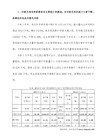
Word-FormationAbstract : A further way besides borrowing in which the vocabulary of English has expanded to accommodate to the natural and social world in which it is used has been to employ means internal to the language itself for devising new word. This is the area of word-formation. Morphological productivity can be defined as the property of a given word formation process to be used to derive a new word in a systematic fashion. Most linguists divide the word-formation into major word-formation and minor word-formation .The major word-formational processes are :-Affixation-Compounding-ConversionThe minor word-formational processes are :-Abbreviation-Back formation-OnomatopoeiaKey Word : affixation, derivative, compounding, abbreviation, onomatopoeia1 AffixationAffixation, also called derivation, is a process in which a free morph is combined with a bound morph, a prefix, or a suffix. It is generally defined as the formation of words by adding derivational affixes to different types of bases . There are two types of derivative . One bases on free root with affix or bound root , the other bases on bound with affix or other bound root .1.1 Types of affixes- prefixes- suffixes- infixesModern English has a number of highly productive affixes. For example, the prefix over can be added to verbs which express activities to indicate that too much has taken place, i.e. something has been overdone, cf. overcook, overcoat, overstay. Likewise, the suffix –n ess can be added to an adjective make a noun designating the quality express by the adjective, its nouniness, so to speak.1.2Two types of derivative’s structure1.2.1 Free root + affix/bound root1) prefix + free roote.g.: In definite (a. uncertain), un forgettable (a. memorable) , mini bus (coach)2)free + suffixe.g. : wealth y (a. rich) , success ful (a, achieving aims) , extreme ly(adv, to a very high de.g.ree) , comfortab ly(adv. in a comfortableway)3)prefix +free root + suffixe.g. : en rich ment (a. sb/sth being rich or richer) , in ternation al (a.connected with two or more countries) , unchangeable (a. that can notbe changed)4)combining form + free roote.g. Afro-American , Afro-Asian , techno-chemistry , microwave1.2.2Bound root + affix/bound root1)prefix + bound root (without formation)e.g. contradict (v. to say sb has said is wrong) , descend (v. go down) ,despair (v. give up all hope)2)bound root (without formation)+ suffixe.g. confidence (n. trust in) , liberate (v. emancipation) , linguist (n. aperson who knows several foreign languages well)3)prefix + bound root (without formation)e.g. distinctive (a. special ) , intolerable (a. can’t bear) , contradiction(n. a lack of agreement between facts)24)combining form + combining forme.g. macrobiosis (n. long life) , microscope (n. an instrument used inscientific study for making very small thing look larger)2CompoundingComposition or compounding is a word-formation process consisting of joining two or more bases to form a new unit, that is, a compound. Compounding is perhaps the most common way of expanding the vocabulary of English. It allows users to combine two familiar words to form a new lexeme.Very often compounds are written as two words, which means that they are accepted into dictionaries a little reluctantly. Certainly, dictionaries seem not to list compounds in anything like the numbers in which they are in use. This may be justified perhaps because compounds are frequently transparent and their meanings are relatively accessible without a dictionary. Furthermore, many of them do not become lexicalized, but have a very transitory life.According to the words’characteristic, there are compound nouns, compound adjectives , compound pronouns , compound verbs , compound adverbs , etc .2.1Compound Nounsn. + n.: bar code , mouse mat , Websitea. + n.: blueprint , compact discadv. + n.: off chance , overdose , underclothes-ing + n.: learning strate.g.y , marketing campaign , parking metern. + v.: daybreak , earthquake , parking meteradv + n : downfall , income , offset , output , upliftv. + adv.: get-together , handout , makeupn. + -ing: air-conditioning , brainstorming , family planningprep.+n.: afternoon , by-product , overcoat2.2Compound AdjectivesAs adjective is a core : airsick , band-new ; dark-blue , icy-cold ;3all-mighty , evergreen , overripeAs noun is a core : blue-collar , present-day ; breaknecl , cross-country ;chicken-hearted , dog-eared , wine-coloredAs –ing or –ed is a core : energy-saving , epoch-marking ; easy-going ,far-reaching ; mass-produced , poverty-stricken ; absent-minded ,half-done , newly-built2.3Compound Verbs1)Formed by back-formation : house-keep from housekeeperwindowshop from window-shoppinghenpeck from henpecked2)Formed by conversion : to blue-printto cold-shoulderto honeymoon3) adv. + v. : cross-questionoffsetoverthrow3ConversionConversion is a word-formation whereby a word of a certain word-class is shifted into a word of another without the addition of an affix. It is also called zero derivation. In other words, conversion or zero derivation is a type word class change without the addition, removal ,or change of any element in the word. In this process a noun maybe used as a verb or a verb can be used as a noun. Furthermore, a noun can be used attributively as an adjective. The most frequent type of conversion is from noun to verb, probably because there are so relatively few verbalizing affixes in English.3.1 n.→ v.1)to put in/on, such as, bottle(n.)→to bottle(=to put …into a bottle)2)to give, to provide with, such as, butter(n.) →to butter(=to spread butteron)3)to deprive of, such as, skin(n.) →to skin(=to remove the skin from)44)to…with, such as, hammer(n.) →to hammer(=to strike with a hammer)5)to be/act as …with respect to, such as, ape(n) →to ape(=to imitate like aape)6)to make/change…into, such as, fool(n.) →to fool(=to make a fool of)7)to send…/go by, such as, bicycle(n.) →to bicycle(=to go by bicycle)3.2adj.→ v.bare(adj.) →to bare, calm(adj.) →to clam, brave(adj.) →to brave3.3v.→ n.Verb converting into noun express the verb’s original action or condition mostly, such as, attempt, look, swim, smile, walk, etc.3.4adj.→ n.Most adjective can be used as noun, such as, an American, an Canadian,etc. There are three type of conversion, full conversion, partial conversionand special conversion.3.5n.→ adj.a brick garage (The garage is brick.)a cotton dress (The dress is cotton.)a gold watch, an iron box, the job market4ShorteningAbbreviation or shortening is the way of shortening or simplifying syllables to make new words. There are various forms of abbreviation, but main forms are four: clipped word, initialism, acronym, blend.4.1 ClippingsSpeakers of English have a great tendency to shorten words. This term refers to the process by which a word of two or more syllables is shortened without a change in its function taking place. It includes apocope, aphaeresis, front and back clipping, and syncope.1) Apocopeapprox.← approximately, auto← automobile52) Aphaeresisburger→ hamburger, bus→ omnibus3) Front and back clippingsThe shortening may occur at the start and the end of the word. e.g., flu(=influenza) / fridge(=refrigerator) / tec(=detective)4) Syncopefluidics← fluidonics, fossilation← fossilizationContractions which is the clipping word with punctuation also can be regarded as this type.4.2 Initialisms and AcronymsInitialisms are words from the initial letters of words which are pronounced as sequences of letters e.g., EEC. Acronyms are also formed from the initial letters of words, but are pronounced as a word, e.g. radar(radio detecting and ranging). Acronyms have always been an integral part of computer culture, and they have since spawned a new language on the Internet. Commonly thought of as a series of letters that make up a “word” there is a distinction between acronyms and shorthand.4.3BlendsBlends are words formed by combining the first element of the first word and the last element of the second word. Blends are created originally for comic effect. Following are some examples:Chunnel(=channel + tunnel) / brunch(=breakfast + lunch) / motel(=motorist+hotel)5Back-formationBack-formation is the process of word-building by which elements are subtracted from a complex word.e.g. beggar---beg burglar---burgleThe majority of backformed words are verbs. There are two types of syntactic relation in verb compounds formed by backformation:1)Object + verb as sightsee (from sight-seeing) meaning somebody sees6sights. Similar examples are: globe-trot(from globe-trotter orglobe-trotting).2)Adverbial + verb, as spring-clean (from spring-cleaning) meaningsomebody cleans in the spring.Back-formations of all kinds are more frequently found in informal than in formal language.6OnomatopoeiaOnomatopoeia is a word-formation which imitate the sound. Imitative words are words formed by imitation of sound. Imitative words divide into primary onomatopoeia and secondary onomatopoeia.The barking of a dog.The crack of a whip.The roll of thunder.The tinkling of bells.There are three types of words formed by imitation of sound:1)The repetition of words: quack; ticktack2)The repetition of words with a vowel change: clitter-clatter; ping-pong;tick-tack.3)Repeating one or more syllables with a consonant change : rub-a-dubt;ran-danReference: Wang Rongpei, Wang Zhijiang, An Advanced Reader of English Lexicology, Shanghai Foreign Language Education Press, 2006汪榕培,王之江,《英语词汇学》,上海外语教育出版社,2008789。
现代英语词汇学

现代英语词汇学一、词汇的构成(Word - formation)1. 词根(Root)- 定义:词根是单词的核心部分,它包含着单词的基本意义。
例如,“vis”在“visible”(可见的)、“vision”(视觉)和“visit”(参观)中是词根,其基本意义与“看”有关。
读音:[ruːt],词性:名词。
2. 前缀(Prefix)- 定义:加在词根前面,改变单词的意义。
例如,“un - ”在“unhappy”(不快乐的)中表示否定。
读音:[ˈpriːfɪks],词性:名词。
- 常见前缀及其意义:- “re - ”(再,又),如“rewrite”(重写)。
读音:[riː - ],词性:前缀。
- “pre - ”(在……之前),如“preview”(预习,预演)。
读音:[priː - ],词性:前缀。
3. 后缀(Suffix)- 定义:加在词根后面,改变单词的词性或意义。
例如,“ - er”在“worker”(工人)中表示“做……的人”。
读音:[ˈsʌfɪks],词性:名词。
- 常见后缀及其作用:- “ - ness”(构成名词,表示性质、状态),如“happiness”(幸福)。
读音:[nəs],词性:后缀。
- “ - ful”(构成形容词,表示充满……的),如“helpful”(有帮助的)。
读音:[fʊl],词性:后缀。
二、词性(Parts of Speech)1. 名词(Noun)- 定义:表示人、事物、地点、抽象概念等。
例如,“book”(书)、“city”(城市)、“love”(爱)。
读音:[naʊn],词性:名词。
- 名词的分类:- 可数名词(Countable Noun),如“apple”(苹果),有单复数形式。
- 不可数名词(Uncountable Noun),如“water”(水),一般没有复数形式。
2. 动词(Verb)- 定义:表示动作或状态。
例如,“run”(跑)、“be”(是)。
词汇学Chapter 5 Word-formation
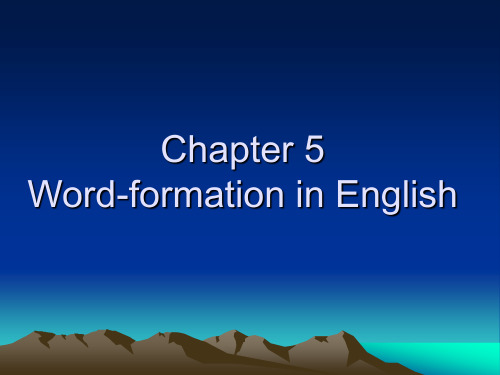
* mis-: wrongly or astray. (+ v/ ed/ ing/ n) miscalculate, misbehaved, misleading… * pseudo-: false or imitation. (n / adj.) pseudoscience, pseudoclassic… (4) Prefixes of degree or size. * arch-: supreme, most (pejorative effect). (+n) archbishop, archenemy (Satan), archdove... * co-: joint, on equal footing. (+n /v) coexistence, coeducation, combine (vowel)...
c) Stem (词干)
A stem is a part of a word, made of a root or a root plus another part. (focus on the original
form, and case etc can be added. ) i) consist of one root morpheme. (= root) sour, sweet, bitter, hot… ii) consist of two root morphemes. (> root) motherland, motorman, dragonfly…(compound) iii) consist of one root morpheme and derivational affix(es). (>root) manly, unmanly, manliness…(complex word)
Lecture 5 Word Formation-《英语词汇学》第五章教案
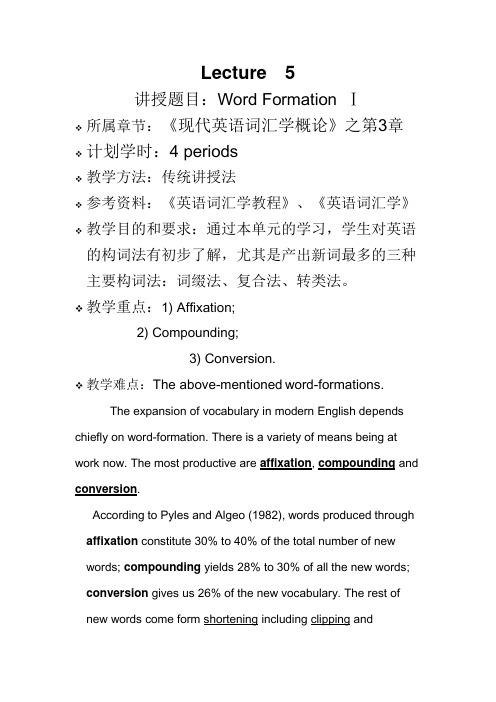
Lecture 5讲授题目:Word Formation Ⅰ所属章节:《现代英语词汇学概论》之第3章 计划学时:4 periods教学方法:传统讲授法参考资料:《英语词汇学教程》、《英语词汇学》 教学目的和要求:通过本单元的学习,学生对英语的构词法有初步了解,尤其是产出新词最多的三种主要构词法:词缀法、复合法、转类法。
教学重点:1) Affixation;2) Compounding;3) Conversion.教学难点:The above-mentioned word-formations.The expansion of vocabulary in modern English depends chiefly on word-formation. There is a variety of means being at work now. The most productive are affixation, compounding and conversion.According to Pyles and Algeo (1982), words produced through affixation constitute 30% to 40% of the total number of new words; compounding yields 28% to 30% of all the new words; conversion gives us 26% of the new vocabulary. The rest of new words come form shortening including clipping andacronymy, amounting to 8% to 10%, together with 1% to 5% of words born out of blending and other means.Talking about word-forming patterns means dealing with rules. But a rule of word-formation usually differs from a syntactic rule. Not all the words that are produced by applying the rule are acceptable. For example, the existence of the actual English words unclean, unwise, unfair does not ensure the acceptance of unsad, unexcellent.Therefore, rules themselves are not fixed but undergo changes to a certain extent. For example, the Old English –th which is found in warmth, length, depth, width, derived from adjectives warm, long, deep, wide,but broad is no longer used to form new word broadth (※coolth)---(Quirk, et al 1985).By word-formation processes, we concentrate on productive or marginally productive rules. While applying the rules, we should remember that there are always exceptions.(在构词过程中,我们要注意到活跃性和边缘性问题。
lecture 5 word formation

21) rupt: to break, or to burst interrupt: to break the flow of sth. bankrupt 22) spect (spec, spic): to look, to see inspect: to examine respect introspect retrospect
7) cad (cid): to fall, to happen by chance accident incident 8) ced (cede, ceed, cess): to go, yield antecedent: a thing, event, etc. coming or being before another suc(near)+ ceed ( pro(向前)+ ceed 继续 向前) 向前 Pre(在前)+ cede 处在 之前 处在…之前 (在前) precedence领先 precedential有先例的 领先 有先例的 9) cid-: to cut, kill suicide insecticide
4.1.2 Prefix 1) a-: not; without: amoral (不属于道德范畴的 不属于道德范畴的) 不属于道德范畴的 cf. immoral不道德的 atypical aperiodic 不道德的 Before letter h or a, a- is changed into an-: Anarchy:an-: without+archy:head or chief Anhydrous: an(without)+hydro(water)+ous 2) dis-:not; without disadvantage disobedient Before f, dis- is changed into dif Difficult: (ficult=facile=easy) diffidence(to distrust) lack of self-confidence
英语词汇学教程课件第5章English Lexicology 5上
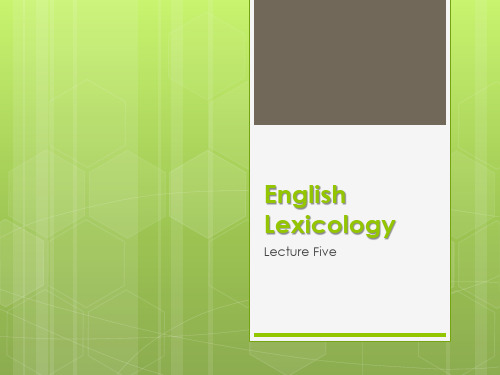
Inflection and Derivation
Inflection results in the formation of alternative grammatical forms of the same word, while derivation creates new vocabulary items.
Irregular inflections are those that do not follow this pattern and which usually apply to only one or a small number of members of the word class concerned.
For example, the following nouns form their plurals irregularly: datum – data, fish fish, goose – geese, man - men, mouse mice, tooth – teeth, woman - women.
words.
For example, the addition of prefixes and suffixes such as mis-, -ness, and –ist, has given English such words as misunderstand, correctness, and economist.
Moreover, the addition of the possessive suffix fits the inflected noun for use in syntax as noun modifier. The noun with the possessive marker can be used as a modifier of another noun, never as a head or main element in a given structure.
英语词汇学lexic5 Minor Processes of Word-formation ppt
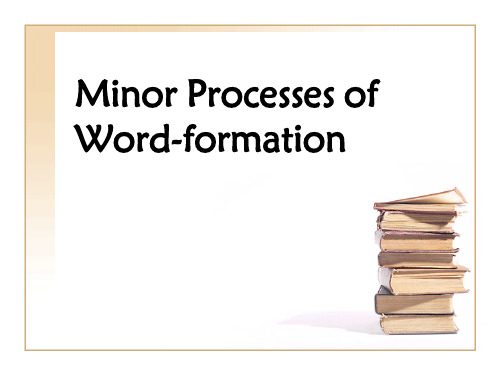
e.g. book-keeper -- to book-keep match-maker -- to match-make merry-making-- to merry-make dress-maker -- to dress-make
5.3 Acronymy -- Initialisms and Acronyms
e.g. bus = omnibus, chute = parachute, copter = plane = helicopter, phone = aeroplane/airplane, quake = telephone, scope = earthquake
telescope; microscope; radarscope etc.
butler----to butle editor--- to edit pedlar -to peddle escalator -- to escalate house sitter -- to house sit vacuum cleaner-Verbs created from abstract nouns
Back-formation is also known as a reverse derivation because a derived form has preceded the word from which it is derived.
1) Verbs created from nouns ending in -er, -or, -ar, e.g.
Structurally blends may be divided into four types: 1. The first part of the first word + the last part of
(词汇学)Word_Formation

There are three major processes of word formation: derivation, compounding and conversion.
<Ⅰ>. Derivation: 〔派生
Derivation or affixation is generally defined as a word-formation process by which new words are created by adding a prefix, or suffix, or both, to the base.
<2> vt﹢object:
pickpocket, reading-material,haircut,letter-writing,
chopstick, pastime, <3> Subject﹢object:
gas-light〔汽灯:"gas produces light," sugar-cane〔甘蔗:"cane produces sugar,"
7. "time and order"prefixes <fore-, pre-, post-, ex-, > eg: forecast <v,n> 预报, foresee <v> 预见, forehead <n> 前额 preview <v> 预习, pre-read <v> 预先阅读, prepay <v> 预付, postwar <adj> 战后的, postgraduate <n> 研究生, postscript <n> 附言, ex-president <n> 前任总统, ex-monitor <n> 前任班长, ex-wife <n> 前妻,
英语词汇学教程课件第5章English Lexicology 5下

The criterion of stress applies only to nominal compounds, and the distinction between compound and idiom becomes fuzzy for verbs and other nominal categories.
Compounding
Compounding refers to the faculty and device of language to form new words by combining or putting together old words.
Compounds are stems consisting of more than one root, e.g. bedside, blackbird, by-effect, rainbow, waste paper basket. Compounding is a very common and frequent process for enlarging vocabulary.
However, in addition to the semantic criterion, we may also use involving order.
In a verb plus adverb compound like forthcoming, there is a clear difference in order between the phrases from which they derive (e.g. come forth) and the resultant compound.
From the root ced (and its variant form cess), ‘go, yield,’ are derived abscess, accede, accessory, ancestry, antecedent, cease, cede, concession, decease, exceed, excessive, incessant, intercede, precede, predecessor, proceed, recede, recess, succeed ….
《英语词汇学》课程教学大纲

《英语词汇学》课程教学大纲课程编码:30615008 学分: 2 总学时:36说明【课程性质】《英语词汇学》为英语专业的专业任意选修课程。
【教学目的】本课程是英语专业高年级阶段的一门专业任意选修课。
本课程的教学目的在于要求学生掌握英语词汇学的基本知识和基本理论,从而更科学地学习英语词汇,运用词汇学中所学到的基本知识和理论来分析和理解英语词汇,正确地使用英语词汇。
【教学任务】《英语词汇学》以帮助学生扩大词汇量,有效运用英语词汇;更深入的理解词义,更有效的组织划分和贮存词汇;增强学生对词义和用法的了解,使学生准确使用词汇;使学生掌握使用参考书的技能,增加解决问题的能力和学习英语的有效性;提高学生的语言接受能力和语言使用能力为教学任务。
【教学内容】词的基本知识、英语的亲属关系与英语词汇的形成和发展、词的形态结构和构成方法、词的意义、语义关系、词义的演变、英语习语、英语词典【教学原则和方法】教学原则:本课程采用张维友编写的《英语词汇学教程》(华中师范大学出版社)为主要教材,在教学过程中坚持以学生为主体,教师为指导的原则,以教材为中心,并适时地向学生介绍英语词汇学的研究动态和最新方向,让学生对词汇学有一个全面系统的了解。
教学方法:在教学过程中,采用论述式、概述式和指引式讲解相结合对教学内容的新信息点、重点、难点进行论述式讲解,深入浅出地详述理论原理,用恰当的例证加以说明,以此帮助学生充分理解理论知识。
对容易懂的内容则进行简明扼要地讲解。
教学中以学习指定的教材为主,适当穿插一些相关的信息材料。
通过对英语词汇学中相关的概念即理论知识的学习和理解,要求学生尽量独立完成教材各部分后面所附的练习,必要时教师可给予适当的指导。
教学手段主要是抽取各部分中的精华部分进行讲解,并适时地采用专题讨论的方式进行学习。
【先修课程要求】要求学生具备英语语音、英语语法、基础英语、英语阅读、英语写作以及翻译等课程知识。
教材:张维友《英语词汇学教程》华中师范大学出版社,2004年。
- 1、下载文档前请自行甄别文档内容的完整性,平台不提供额外的编辑、内容补充、找答案等附加服务。
- 2、"仅部分预览"的文档,不可在线预览部分如存在完整性等问题,可反馈申请退款(可完整预览的文档不适用该条件!)。
- 3、如文档侵犯您的权益,请联系客服反馈,我们会尽快为您处理(人工客服工作时间:9:00-18:30)。
Lecture 5讲授题目:Word Formation Ⅰ所属章节:《现代英语词汇学概论》之第3章 计划学时:4 periods教学方法:传统讲授法参考资料:《英语词汇学教程》、《英语词汇学》 教学目的和要求:通过本单元的学习,学生对英语的构词法有初步了解,尤其是产出新词最多的三种主要构词法:词缀法、复合法、转类法。
教学重点:1) Affixation;2) Compounding;3) Conversion.教学难点:The above-mentioned word-formations.The expansion of vocabulary in modern English depends chiefly on word-formation. There is a variety of means being at work now. The most productive are affixation, compounding and conversion.According to Pyles and Algeo (1982), words produced through affixation constitute 30% to 40% of the total number of new words; compounding yields 28% to 30% of all the new words; conversion gives us 26% of the new vocabulary. The rest of new words come form shortening including clipping andacronymy, amounting to 8% to 10%, together with 1% to 5% of words born out of blending and other means.Talking about word-forming patterns means dealing with rules. But a rule of word-formation usually differs from a syntactic rule. Not all the words that are produced by applying the rule are acceptable. For example, the existence of the actual English words unclean, unwise, unfair does not ensure the acceptance of unsad, unexcellent.Therefore, rules themselves are not fixed but undergo changes to a certain extent. For example, the Old English –th which is found in warmth, length, depth, width, derived from adjectives warm, long, deep, wide,but broad is no longer used to form new word broadth (※coolth)---(Quirk, et al 1985).By word-formation processes, we concentrate on productive or marginally productive rules. While applying the rules, we should remember that there are always exceptions.(在构词过程中,我们要注意到活跃性和边缘性问题。
必须记住,规则都有例外。
)1. Affixation (词缀法)Affixation is generally defined as the formation of words by adding word-form or derivational affixes to stems. This process is also known as derivation, for new words created in this way are derived from old forms.The words formed in this way are called derivatives. According to the positions which affixes occupy in words, affixation falls into two subclasses: prefixation and suffixation.1) Prefixation (前缀法)※Prefixation is the formation of new words by adding prefixes to stems.※Prefixes do not generally change the word-class of the stem but only modify its meaning. However, present-day English finds an increasing number of class-changing prefixes, for example:asleep, alike, alive (a- + v. →adj.) a- ( in, to, at, on)encourage, entrain, endanger (en- + n. →v.) en- (to put or get into)enlarge, enrich, enable (en- + adj. →v.) en- (to cause to be)belittle, becalm (be- + adj. →v.)bedazzle, bewitch (be- + n. →v.) be-(to make, tocause to be )deplane, detrain (de- + n. →v. )de- (to get off)postwar, postliberation (post- + n. →adj.)post- (after, later than)inter-laboratory, intercollege (inter- + n. →adj. ) inter- (between, among)These make up only an insignificant number in the huge contemporary vocabulary.The majority of prefixes are characterized by their non-class changing nature. Their chief function is to change meanings of the stems. Accordingly, we shall classify prefixes on a semantic basis into nine groups.1) Negative prefixesPrefixationOrderLiterateSymmetryGovernmentalRelevantProductiveBelievableVulnerableSaneRelatedAlignedMatureDisorderIlliterateAsymmetryNongovernmentalIrrelevantUnproductiveUnbelievableInvulnerableInsaneUnrelatedNonalignedImmature※Of this group, un- is by far the most productive and can usually replace in- or dis- with adjectives for actual use as in unreplaceable, unmovable for irreplaceable and immovable.2) Reversative PrefixesPrefixationCentralizePlaneInfectZipRegulatePossessPolluteDecentralizeDeplaneDisinfectUnzipDeregulateDispossessDepollute3) Pejorative prefixesPrefixation4) Prefixes of degree or sizePrefixationComputerCriticalConsciousNaturalSensitiveSimpleNumberStatementcultureMinicomputerUltracritic /hypercriticSubconsciousSupernaturalHypersensitive/ultrasensitiveOversimpleOutnumberUnderstatementSubculture5) Prefixes of orientation and attitudePrefixation6) Locative prefixesPrefixationViewConferenceContinentalGroundCastSpecificRacialShoreInterviewteleconferenceIntercontinentalForegroundTelecastTranspacificTransracialForeshorePrefixation7) Prefixes of time and orderPrefixation8) Number prefixesPrefixation⑨Miscellaneous prefixes:auto – (self):autobiography, autonomy, autonym.noe- (new): neoclassicism, neologism, neonatal (初生的) pan- (all): pan- European, panacea (万灵药), panorama (全景,全图).vice- (in place of): vice-president, vice- minister, vice-govemor 副州长2) Suffixation 后缀法Suffixation is the formation of words by adding suffixes to stems.Suffixes are of two kinds: class changing and class maintaining.Class-changing suffixes change the word class of the word to which they are added, e.g. –ity in electricity. Class-maintaining suffixes do not change the word class but changes the meaning of the derivative, e.g –hood in boyhood. Unlike prefixes, most of the English suffixes are class-changing.SuffixationThe classification of suffixesSince suffixes mainly change the word class, we shall groupsuffixes on a grammatical basis into1) noun suffixes2) adjective suffixes3) adverb suffixes4) verb suffixes1) Noun suffixesNoun suffixes may be subdivided into the following five kinds.Denominal nouns (来自名词的名词)Deverbal nouns(来自动词的名词)De-adjectival nouns(来自形容词的名词)Noun and adjective suffixes2) Adjective Suffixes3) Adverb Suffixes4) Verb suffixesFa lseSterileIntenseFatHorrorMemoryApologyFalsifySterilizeIntensifyFattenHorrifyMemorizeApologizeSome modern affixes 1. Mega-(very large)Megacity特大城市Megadestruction大毁灭Megagame大赛Megastructure超级建筑Megarich十分富有Megaversity超级大学2.Cyber-(automatic/computerized)Cyberculture电脑化文化/电脑化社会Cyberbrain电脑Cyberart电脑艺术/计算机技术Cyber-security 网络安全Cyber-space网络虚拟空间Cyber-privacy网络隐私Cyber-sex网络色情Cyber-punk网络高手cyberfiction网络小说3.Hyper-(super/too much)Hypermedia超媒体Hyperlinks超级链接Hyperfriction过度摩擦Hyperslow极缓慢的Hyperverbal说话过多的Hyperaccess超级访问软件Hypertext超文本Some modern affixes4. Info- (information)Infotech信息技术Infocenter信息中心Infotainment信息娱乐节目Infomercial信息商业化的/商业信息片5. nano- (one billionth)Nanotech纳米技术Nanofabrication纳米加工Nanocomputer超高速电脑6.techno- (technology)Technomania技术热Technophobia恐技术症Technocracy专家政治、技术专家治国制度techno-centric 以技术为中心的7. tele- (long-distance transfer/television)Telead电话约定广告Telebanking电脑化银行业务Telebus电话叫车/租车Telecenter远程计算中心Tele-education远程教育Some modern affixes8. E- (electronic)E-mail电子邮件E-text电子文本E-zine电子杂志E-cash电子货币9. Of- (office)Oftel办公电话Oflot公司内部停车场地Ofbank银行办事处Some modern affixes10. -bot (robot)Knowbot智力机器人Mobot移动机器人Microbot微型机器人11. –size (measurements)Downsize缩小Upsize放大Rightsize按比例制作life-size 按实物大小制作12. –nick (以…..为特征的人;参加…. 的人)Earthnick 地球人Computernick 电脑迷Peacenick追求和平者Jobnick 工作迷No-goodnick 不怀好意者13.-centric (of the center/taking…as the center)Male-centric以男士为主的Net-Centric War 网络中心战IBM compatible-centric以销售IBM兼容机为主的User-centric以用户为中心的 14. –ware (articles of the same kind)Glassware玻璃器皿Soft/hardware软/硬件Middleware中间设备Silverware银器Warehouse仓库15.franken- (转基因的;经过基因工程的)Frankenfruit 转基因水果Frankenfood 转基因食品Frankenplant 转基因植物2. Compounding (复合法/合成法)Compounding, also called composition, is the formation of new words by joining two or more stems. Words formed in this way are called compounds.So a compound is a ‘lexical unit consisting more than one stem and functioning both grammatically and semantically as a single word’ (Quirk et al 1985).CompoundingForms of compoundsSolid: bedtime, honeymoonHyphenated: above-mentioned, town-planningOpen: reading material, hot lineCompoundingTypes of compoundsNoun compoundsAdjective compoundsVerb compoundsCompoundingNoun compoundsHeadache, housekeeping, hot line, swimming pool, raindrop, breakdown, biological clock, identity crisisCompoundingAdjective compoundsWeather-beaten rocks, peaceloving people, everlasting friendship, adifficult-to-operate machine, a made-up story, an on the spot inspection, taxfree products, fire-proof dressCompoundingVerb compoundsFormed by back-formationh ouse-keep from housekeeperw indowshop from window-shoppingm ass produce from mass productionh en-peck from hen-peckeds poon-feed from spoon-fed.CompoundingVerb compoundsFormed by conversiont o blue-print, to cold-shoulder, to outline, to honeymoon, tosnowball, to chain-smoke, to sweet-talk, to job-hop.3. Conversion (词类转化法/转类法)The definition of conversion①Conversion is the formation of new words by converting words of one class to another class. This is a method of turning words of one part of speech to those of a different part of speech.②Conversion is a word-formation whereby a word of a certainword-class is shifted into a word of another without the addition of an affix. It is also called zero derivation(零位派生).ConversionMajor types of conversionNoun-verb conversionVerb-noun conversionAdjective-noun conversionNoun-verb conversionHe elbowed his way through the crowd.Problems snowballed by the hour.The newspaper headlined his long record ofaccomplishments.Kissinger got the plans and helicoptered to Camp David.Verb-noun conversionHe was admitted to the university after a three-year wait.This little restaurant is quite a find.It is a good buy.He took a close look at the machine.doubt, smell, desire, want, attempt, hit, reply, divideVerb-noun conversionPhrasal verb-noun conversionAdjective-noun conversionPartial conversionComplete conversionAdjective-noun conversionPartial conversionD enoting a quality or a state common to a group of person:the deaf, the blind, the poor, the woundedD enoting peoples of a nation (ending in –sh, -se, -ch): theEnglish, the Chinese, the Danish, the ScotchD enoting a quality in the abstract: a strong dislike for thesentimental, to distinguish the false and the true, from thesublime to the ridiculousD enoting a single person (converted from participles): theaccused, the deceased, the deserted, the condemnedAdjective-noun conversionComplete conversionA native, two natives, a returned nativeHe is a natural for the job.Tom is one of our regulars, he comes in for a drink aboutthis time every night.To them she is not a brusque crazy, but appropriatelypassionate.They are the creatives in the advertising department. Miscellaneous conversiona. Would you like a with or a without? 你是要这个,还是不要这个?b. His argument contains too many ifs and buts. 他的争辩托词太多。
